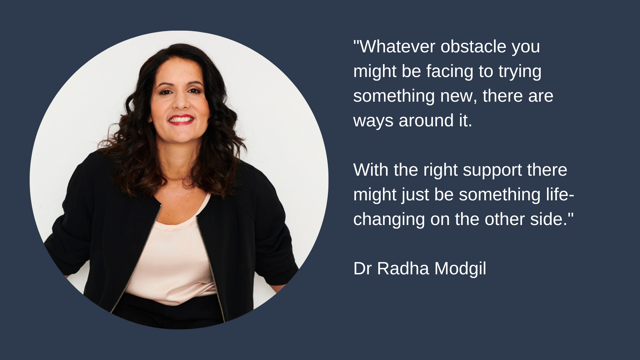by Dr Radha Modgil
Human beings are creatures of habit, and although sometimes we know that change is needed, we often find trying something new tricky and challenging.
Most of us know that certain activities - like connecting with other people in our local community through singing, gardening or art - can have a positive impact on our health and wellbeing.
Trying something new can build our confidence, reduce loneliness, help us find more purpose in our lives, tap into what we love and help us thrive.
But if someone suggests you start something like this, or even if you think about it, it can throw up anxieties and fears.

What are the obstacles we face?
Starting something new can throw up all kinds of feelings, and there may be many obstacles that get in the way of us taking that first step.
Maybe you worry you won’t ‘fit in’, or you feel shy or have got out of the habit of meeting new people.
There may also be life circumstances - from caring responsibilities to financial worries to a health condition - that contribute to finding it hard to start something new.
Maybe you are concerned about practical things like how you are going to physically get to that activity or venue, or how you are going to find the time or space. Maybe you’re worried you won’t be able to commit to something regularly because of your health.
These are all perfectly appropriate and understandable worries. However, with the right support, we can usually find ways to overcome them.

Five tips for starting something new
So, what kinds of things might support you to start something new?
1. Think about your ‘why’
Why do you want to start something new? What are your specific reasons, not someone else’s reasons, for thinking about doing this? Write down a list of potential benefits. Think about what matters to you and what might support you to feel better and live the life you want. Getting clear about your reason ‘why’ can help you persevere in that change.
2. Start small and go slow
We are more likely to carry on with something new if we make it manageable and avoid making it overwhelming at first. Think about one small step you can take that might start that momentum going.
3. Find someone to support you
We all need support sometimes, so why not think about taking a friend to start with, so you feel more comfortable? Someone to support us in something new takes the pressure off slightly. Asking them to help us with practical considerations or making a plan of how we could create more time, or get to that venue for example, can also be helpful.
4. Do a ‘test run’
Often you don’t have to go full-on into something new, and many activity groups offer a taster session or a drop-in session. This might help to reduce the stress you feel. It means you don’t have to commit until you feel you are able.
5. Make use of social prescribing
Social prescribing is a way of connecting people to activities in their local area to support their health and wellbeing. You can ask your GP practice to refer you to a Social Prescribing Link Worker, who can spend time with you working out what matters to you and what you may need, and then support you in making those changes.
Link workers will know what’s going on in your area, including activities that are free or don’t cost very much. They can provide a holding hand when you start a new activity like a woodwork class, or a walking football group. They can help you identify what obstacles there might be and how to overcome those, as well as potentially going along with you to that first new thing that you try.
Whatever obstacle you might be facing to trying something new, there are ways around it. With the right support there might just be something life-changing on the other side.


